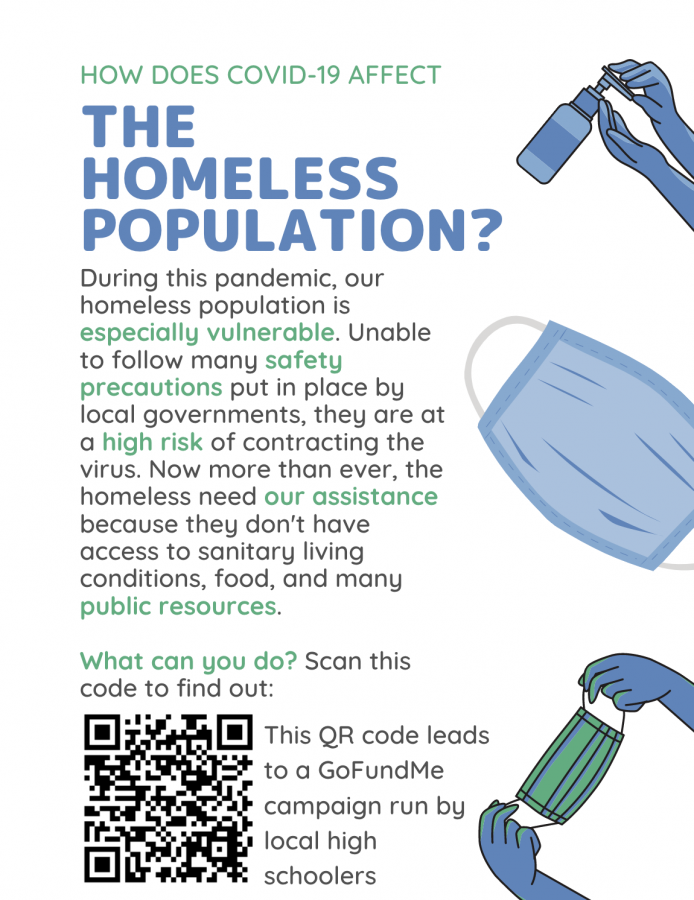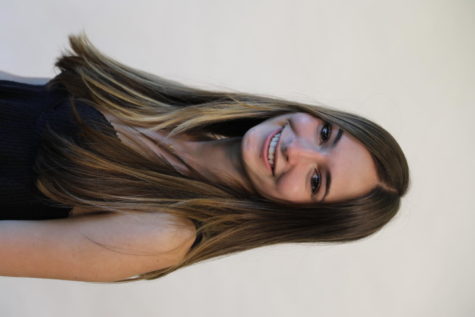Menlo Students Hone in on Social Justice Interests With Knight Vision Summer Program
Menlo freshmen Theo Sanders and Galen Horchner designed a flyer for their CASE project on how COVID-19 affects homeless individuals. Photo courtesy of Theo Sanders.
September 25, 2020
Every year, Menlo students are exposed to a plethora of summer opportunities and activities. However, the unprecedented circumstances of COVID-19 have brought most of these options to a halt, so the student body was forced to come up with alternative, more creative ways to fill their summer. Menlo Upper School’s community engagement club, Knight Vision, rose to this unique occasion.
Rather than focusing on the downfalls of the pandemic, Knight Vision co-president Allison Pittman interpreted this unique time as a chance for a completely new project: an internship program of their own.
“[The other club leaders] told me, ‘You’re crazy, it’s June. There’s no way we’re going to do it.’ But I said, ‘No, we are going to do it,’” Pittman said. “We need to give people something to do over the summer.”
In late June, Knight Vision’s leadership team immediately began to craft an internship proposal. In a matter of days, what started as a mere suggestion proposed transformed into a comprehensive summer opportunity accessible to Menlo Upper School students. This opportunity became known as the Community Action Summer Experience (CASE).
With CASE, in addition to helping students occupy their free time, Knight Vision aspired to incentivize students to take social justice action within their local and broader communities. The Knight Vision student leaders encouraged students to use CASE to expand on contemporary societal issues. “In a time of so much national and international turmoil, we wanted to give people a platform to speak on issues they cared about,” Pittman said.
Although participants were encouraged to choose any topic they felt particularly drawn to, Knight Vision centered their initiative around three main categories: COVID-19, Black Lives Matter and the upcoming elections.
The CASE program attracted 19 participants from the Upper School, and each individual or pair devised a plan unique to their interests. Students began with a two-week research phase, followed by a four-week project phase and, finally, a two-week awareness phase. Over the course of two months, participants met weekly with their designated Knight Vision leader to help facilitate each stage of their project. Each participant’s dedicated partner was either Knight Vision’s Secretary/Treasurer Reena Kagan, co-president Emily Han or 11th grade representative Gus McGaraghan.
Menlo junior Ayla Seddighnezhad, intrigued by social media posts on Yemen’s Humanitarian Crisis, felt inspired to contribute to the awareness campaign. These feelings eventually led to her CASE project where she seized the initiative as an opportunity to delve deeper into this pressing issue. “Upon researching, I realized that there are so many more issues regarding the Yemen Crisis than I imagined,” Seddighnezhad said. “The [topic] is not getting the coverage and news it deserves.”
For the action stage of her project, Seddighnezhad created a GoFundMe to support Yemen’s needs. The fundraiser surpassed her original goal of $1,000 and collected over $1,330 in donations. She will disperse these donations among Islamic Relief USA, Doctors Without Borders and United Nations Children’s Fund (UNICEF).
Seddighnezhad’s research later culminated in an online message to Congress member Kamala Harris — the final aspect of her project. In the letter, Seddighnezhad highlighted the severity of the issue and unpacked why the U.S. needs to financially assist Yemen, exhibiting a theme of moral prioritization over military interests. “Although I wasn’t expecting a response, I think that if more people continue to send messages concerning the topic, it will be heard,” Seddighnezhad said.
Like Seddighnezhad, CASE allowed freshmen Theo Sanders and Galen Horchner to broaden their knowledge on a subject that stood out to them. Upon deciding to pursue a COVID-19-related topic, the pair conducted research concerning the pandemic’s societal consequences. This initial research stage led to their discovery that the pandemic disproportionately affects the homeless population, sparking their interests to the point of further action.
After ample research, Sanders and Horchner became familiar with the problematic ways in which the homeless are affected by COVID-19. “We found out that the homeless heavily rely on public resources like restrooms, parks and benches. But with the coronavirus, these [spaces] are extremely difficult to find,” Horchner said. “They also need things like PPE [personal protective equipment].”
To take action, Sanders and Horchner channeled their energy toward one facet of this burgeoning issue. They conducted an interview with Palo Alto Life Moves Opportunity Center employee, Robert Smith, to determine how exactly they would help. “We wanted to create a drive for an item that would keep [homeless individuals] safe and build stability [for them],” Sanders said. “Through the interview with Life Moves, we found out that item was masks.”
In their partnership with Life Moves, Sanders and Horchner created a GoFundMe that would benefit the non-profit. To publicize their fundraiser, they posted a YouTube video and accompanying flyers to spread awareness for their project and the societal issue as a whole. Ultimately, the duo generated over $1,626 in donations, which Life Moves will use to help cover the cost of PPE for the homeless in the Bay Area.
While Seddighnezhad, Sanders and Horchner turned to fundraisers with their initiatives, senior Celeste Aguilar took a different approach with hers: a speech. She wanted to find a way to catalyze conversation on the topic at Menlo, specifically in relation to the Black Lives Matter movement. “I have always wanted to do something with social activism, especially with issues of civil rights,” Aguilar said. “The CASE program was a perfect opportunity for me to hone in and refine some of the things I wanted to learn about.”
Throughout the summer, Aguilar further educated herself on police brutality and its origin, black appropriation and the Black Lives Matter movement. In the future, Aguilar plans to apply this research to her speech, constituting the awareness phase of her CASE project. “I want [the Menlo community] to see the Black Lives Matter movement as a discussion that’s more than just black and white,” she said.
For the concluding portion of the CASE initiative, each of the 19 participants created a presentation that summarized their project and its involved processes. This showcase lasted four nights and attracted over 200 total attendees. “This was the first program where I had done something more generic than just helping people,” Seddighnezhad said. “[My project] wasn’t something that I did to just make my resume look good. This was actual change that will benefit Yemen.”



